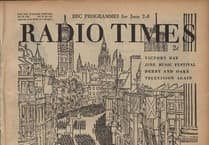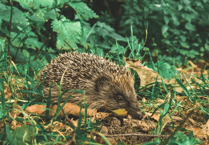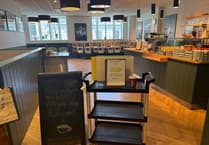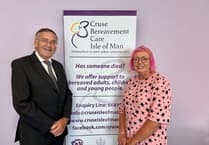After receiving a good response to looking at the centenary of the BBC last week, I thought I might have a look back at some elements of its music output this week.
The first daily radio broadcast was on November 14, 1922, and at that time in the UK only 30,000 people owned a radio licence.
By 1926 the figure had risen to two million.
Music soon became the key driver for entertainment including the BBC Dance Orchestra and the BBC Symphony Orchestra bringing a more classical genre.
I had no idea until doing a little research thanks to Google that the BBC shut down its television output just before the outbreak of the Second World War and did not return until June 1946.
BBC Radio continued and during this period one of the programmes introduced, which has stood the test of time, is ‘ esert Island Discs’. It was broadcast from a bomb-damaged Maida Vale studios on January 29, 1942. Created by Roy Plomley it remains popular to this day.
Well over 3,000 episodes have been recorded. Each week a guest, called a ‘castaway’ is asked to choose eight recordings, a book and a luxury item that they would take if they were to be cast away on a desert island.
Fast forward to the 1960s when it became clear that those at the BBC were a little out of touch with the popular music tastes of the day – certainly as far as young people were concerned.
The arrival from 1964 onwards of the ‘pirate’ radio stations, symbolised most by Radio Caroline, Radio Atlanta and Radio London, which played what the younger demographic wanted.
Who remembers Radio Caroline in Ramsey Bay? On Monday, July 6, 1964, MV Caroline anchored for the first time in this location using the call sign ‘Radio Caroline North’. Its output reached the north and Midlands of England, most of Wales, south west Scotland and much of the north and east of Ireland.
Manx Radio had begun broadcasting on June 29, 1964, almost 10 years before commercial radio was licensed in the UK.
The licence for Manx Radio had required the permission of the UK General Post Office for a frequency and permission to broadcast.
This had been first requested in 1960 – forward thinking or what?
At Easter 1965 Radio Caroline celebrated its first birthday with the introduction of four ‘Bell Awards’. Best group record of the year; The Animals ‘House of the Rising Sun’; Best and most consistent artists, The Beatles; Best female recording Petula Clark, ‘Downtown’. (The first record I ever bought!) Best male recording, Tom Jones, ‘It’s Not Unusual’.
The subject of Radio Caroline deserves a future piece here but I will leave things for now with several conversations I have had with broadcaster Andy Wint with which I agree.
We don’t make enough of our national assets of Radio Caroline, the Bee Gees and the TT by way of celebrating their history and significance to the island.
A three-way presentation of their impact to our island would pay dividends in terms of visits from fans and others worldwide.
Back to the BBC. The cultural impact of the pirate stations was such that the UK government drew up its white paper on broadcasting policy in December 1966.
This ultimately led directly to an act of parliament making working for a pirate station illegal but also the formulation of BBC Radio One.
Now as those who study Manx politics will know there was a significant challenge from Tynwald in respect to aspects of this but that’s for another day.
BBC Radio One launched on September 30, 1967, recruiting many leading pirate broadcasters, such as Tony Blackburn and Kenny Everett.
The first record to be heard in full on Radio One was ‘Flowers in the Rain’ by the Move, the number two record in the top-20 that week.
The second single was ‘Massachusetts’ by the Bee Gees.
Much airtime was shared with BBC Radio Two and, despite initial setbacks, became the most listened-to station in the world with audiences of more than 10 million claimed for some shows.
The competition to Radio One came principally from Radio Luxembourg.
As a boy I remember taking the quite bulky transistor radio to bed and listening to its output under the bed covers.
Alan Freeman’s ‘Saturday Rock Show’ was voted ‘Best Radio Show’ five years running by readers of a national music publication.
He also presented ‘Pick of the Pops’ from 1961 to 2000, and was a regular member of the panel on ‘Juke Box Jury’.
The first female DJ on Radio One was Annie Nightingale, whose first programme aired on October 5, 1969, and is the longest-serving presenter. Can you believe she is now 82?
There have been so many presenters who have gone on to be household names who have worked on BBC Radio One or Two.
I’m sure you can think of lots but here’s a few… John Peel, Ed Stewart, Jimmy Young, Simon Dee, Terry Wogan, Tommy Vance, Emperor Rosko, David ‘Kid’ Jensen, Dave Lee Travis, Noel Edmonds, Steve Wright,Janice Long,Andy Kershaw, Simon Mayo, Chris Evans, Chris Moyles, Johnnie Walker, Bob Harris, Pete Murray and lots more.
In 1979 I entered the BBC Radio Two Music Game.
It was hosted by David ‘Diddy’ Hamilton and the station would ring contestants up and you were required to answer 10 questions live on air.
At that time I was manager of the original Moochers in Wellington Street and upstairs there was a flat.
There was no telephone in the shop and we certainly didn’t have mobile phones at that time.
I left the shop unattended and went upstairs to answer the questions which turned out quite well.
I won five LPs including Gerry Rafferty ‘Baker Street’ and Supertramp ‘Breakfast in America’.
Ultimately I qualified for the finals of the UK Music Game (yes I know!) which was broadcast live from studios in London.
I’m almost certain that the BBC paid for my transport to London and an overnight stay but it was certainly a great experience.
In the competition itself I finished second so wasn’t whisked off to Copenhagen for the European version of the Music Game. I think it’s obvious that live music and its broadcast via radio has been an important part of my life.
It’s clear now that my trot through music on the BBC has failed miserably in certain key aspects to which with your agreement I will return.
While I have covered some aspects of radio coverage and I will return to it again in the future. Space doesn’t allow me the luxury of sharing music on TV in this piece.
Please contact me via the usual channels with music programmes or memories on BBC that you have enjoyed. Here’s a few tasters… Six five special; The Old Grey Whistle Test; Top of the Pops; Juke Box Jury. On Independent TV they include Thank Your Lucky Stars, Ready Steady Go. How about variety shows, comedy, quiz shows in the 100 years of the BBC. Which have been your favourites and why? Please let me know.




